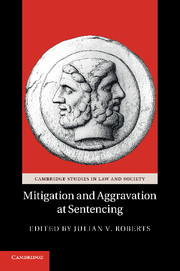Book contents
- Frontmatter
- Contents
- Tables
- Contributors
- Foreword
- Acknowledgments
- Chapter one Punishing, more or less
- Chapter two Re-Evaluating the Justifications for Aggravation and Mitigation at Sentencing
- Chapter three The Search for Principles of Mitigation
- Chapter Four Personal Mitigation and Assumptions about Offending and Desistance
- Chapter Five Intoxication as a sentencing factor
- Chapter Six Beyond the Partial Excuse
- Chapter Seven Equality before the law
- Chapter Eight Personal mitigation
- Chapter Nine Exploring Public Attitudes to Sentencing Factors in England and Wales
- Chapter Ten The Pernicious Impact of Perceived Public Opinion on Sentencing
- Chapter Eleven Addressing Problematic Sentencing Factors in the Development of Guidelines
- Chapter Twelve Proof of Aggravating and Mitigating Facts at Sentencing
- Chapter Thirteen Mitigation in Federal Sentencing in the United States
- Chapter Fourteen The discretionary effect of mitigating and aggravating factors
- Index
- References
Chapter Seven - Equality before the law
Racial and social background factors as sources of mitigation at sentencing
Published online by Cambridge University Press: 07 September 2011
- Frontmatter
- Contents
- Tables
- Contributors
- Foreword
- Acknowledgments
- Chapter one Punishing, more or less
- Chapter two Re-Evaluating the Justifications for Aggravation and Mitigation at Sentencing
- Chapter three The Search for Principles of Mitigation
- Chapter Four Personal Mitigation and Assumptions about Offending and Desistance
- Chapter Five Intoxication as a sentencing factor
- Chapter Six Beyond the Partial Excuse
- Chapter Seven Equality before the law
- Chapter Eight Personal mitigation
- Chapter Nine Exploring Public Attitudes to Sentencing Factors in England and Wales
- Chapter Ten The Pernicious Impact of Perceived Public Opinion on Sentencing
- Chapter Eleven Addressing Problematic Sentencing Factors in the Development of Guidelines
- Chapter Twelve Proof of Aggravating and Mitigating Facts at Sentencing
- Chapter Thirteen Mitigation in Federal Sentencing in the United States
- Chapter Fourteen The discretionary effect of mitigating and aggravating factors
- Index
- References
Summary
Some sentencing factors are offence-specific, while others cut across all forms of offending. One of the most important – and contested – examples of the latter is the offender’s social background. Are offenders who present for sentencing with a socially disadvantaged background – or who belong to a minority group which historically has been associated with high rates of imprisonment – entitled to some mitigation on this basis?
CHAPTER OVERVIEW
This chapter explores how courts in Australia and Canada have dealt with the relevance of race and cultural and social background factors, and it considers these sources of mitigation in the light of the principle of equality before the law. It begins with a short discussion of the principles of equality followed by a sketch of the over-representation of Aboriginal people in prisons in the Western world, before focusing on the way in which Australian and Canadian jurisdictions have dealt with the relevance of factors associated with Aboriginality. Analysis of the position in Australian jurisdictions suggests that, in recent years, courts have moved from a position which accepted that a more lenient approach to Aboriginal offenders was justified to one which emphasizes the need to denounce and deter violence. While this appears to be a reaction to a legitimate concern with problems of violence in Aboriginal communities, the criticisms of this approach are outlined. The Canadian Supreme Court’s decision in Gladue is then discussed, together with the arguments of its critics and advocates and its extension to other socially and economically disadvantaged offenders.
- Type
- Chapter
- Information
- Mitigation and Aggravation at Sentencing , pp. 124 - 145Publisher: Cambridge University PressPrint publication year: 2011
References
- 3
- Cited by

